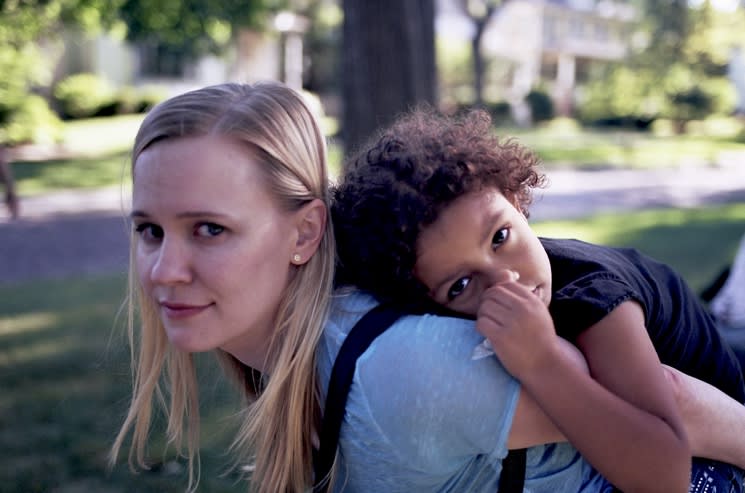We know we're not supposed to flush tampons down the toilet, but we also know exceptions in cases of emergency tend to be made. This is demonstrated by Bridget (Kelly O'Sullivan) in Saint Frances, a movie that oozes blood in the way that so many people's everyday lives do; it's a comedy that excels in normalizing this kind of mundanity. In other words, Saint Frances is a film that acknowledges aspects of women's lives that don't often get a cinematic treatment, and this is why it's not just good, it's radical — it succeeds as not just a challenge to traditional male-gaze films, but to the patriarchy itself.
The movie was directed by Alex Thompson and written by O'Sullivan. Bridget is the protagonist who starts the film off in her mid-30s working at a diner. Having become dissatisfied with where she is in life, she lands the position of nanny to six-year-old Frances (Ramona Edith Williams), whose moms have had another baby. While Annie (Lily Mojekwu) goes back to work, and Maya (Charin Alvarez) looks after the baby at home, Bridget and Frances find they have a lot in common.
Along the way there is an unwanted pregnancy for Bridget, who, with her new-ish boyfriend, decides she wants an abortion, and the revelation of Maya's postpartum depression, which causes difficulties in her and Annie's relationship.
The film shows these events in a way that doesn't sensationalize them, but also doesn't trivialize them. In other words, the film employs the female gaze. A reaction to the dominant male gaze (considering a woman for her relation or meaning to a man), the female gaze depicts aspects of women's lives that filmmakers working in the male gaze don't or can't notice. Men can work in the female gaze just as women can make films through the male gaze.
Accordingly, Saint Frances depicts the necessity of the ordinary, looking at women in their own right. The women in this film forge meaningful bonds with each other, and they are given the space to have conversations that are self-aware and authentic. After a hike with her mother, Bridget tells Maya that she should be able to talk freely about her postpartum depression. The film also does a good job of depicting Annie's stress in providing for her family, and her confusion and helplessness as she negotiates her way around Maya.
And Frances herself is allowed to be a kid. She isn't a precocious mini-adult who tests her nanny. Rather, she is a clumsy child who gets angry, happy, curious and everything in between. "My guitar class is a patriarchy," Frances says right after learning the word's meaning. Williams is hilarious as Frances, and while the movie is predominantly about Bridget, Frances is the anchor grounding all the other characters.
O'Sullivan plays Bridget intelligently and sympathetically, showing her as a nuanced figure who makes mistakes, is honest to a fault, and remains lovable. In one endearing moment in the film, Frances tells Bridget she is proud of her because she tries even when she is scared.
Depicting well-developed and textured women bleeding, crying, unhappy, being wrong, and scared, Saint Frances is an excellent example of a movie thwarting the male gaze, challenging patriarchal notions and taboos — all while being fantastically funny.
(Oscilloscope)The movie was directed by Alex Thompson and written by O'Sullivan. Bridget is the protagonist who starts the film off in her mid-30s working at a diner. Having become dissatisfied with where she is in life, she lands the position of nanny to six-year-old Frances (Ramona Edith Williams), whose moms have had another baby. While Annie (Lily Mojekwu) goes back to work, and Maya (Charin Alvarez) looks after the baby at home, Bridget and Frances find they have a lot in common.
Along the way there is an unwanted pregnancy for Bridget, who, with her new-ish boyfriend, decides she wants an abortion, and the revelation of Maya's postpartum depression, which causes difficulties in her and Annie's relationship.
The film shows these events in a way that doesn't sensationalize them, but also doesn't trivialize them. In other words, the film employs the female gaze. A reaction to the dominant male gaze (considering a woman for her relation or meaning to a man), the female gaze depicts aspects of women's lives that filmmakers working in the male gaze don't or can't notice. Men can work in the female gaze just as women can make films through the male gaze.
Accordingly, Saint Frances depicts the necessity of the ordinary, looking at women in their own right. The women in this film forge meaningful bonds with each other, and they are given the space to have conversations that are self-aware and authentic. After a hike with her mother, Bridget tells Maya that she should be able to talk freely about her postpartum depression. The film also does a good job of depicting Annie's stress in providing for her family, and her confusion and helplessness as she negotiates her way around Maya.
And Frances herself is allowed to be a kid. She isn't a precocious mini-adult who tests her nanny. Rather, she is a clumsy child who gets angry, happy, curious and everything in between. "My guitar class is a patriarchy," Frances says right after learning the word's meaning. Williams is hilarious as Frances, and while the movie is predominantly about Bridget, Frances is the anchor grounding all the other characters.
O'Sullivan plays Bridget intelligently and sympathetically, showing her as a nuanced figure who makes mistakes, is honest to a fault, and remains lovable. In one endearing moment in the film, Frances tells Bridget she is proud of her because she tries even when she is scared.
Depicting well-developed and textured women bleeding, crying, unhappy, being wrong, and scared, Saint Frances is an excellent example of a movie thwarting the male gaze, challenging patriarchal notions and taboos — all while being fantastically funny.
